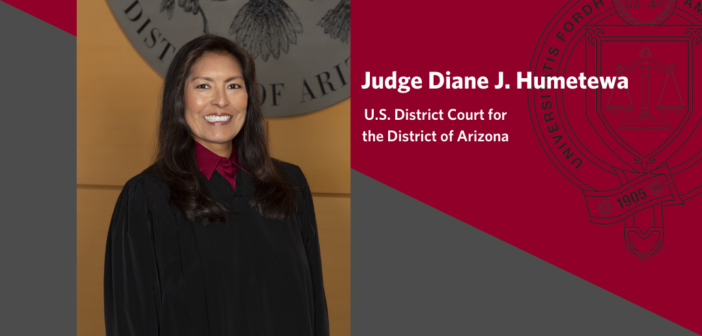The Center for Judicial Events & Clerkships (CJEC) welcomed Judge Diane J. Humetewa from the U.S. District Court for the District of Arizona as its speaker for the third annual First to the Bench Program. Judge Humetewa is the first Native American woman and enrolled tribal member to serve on the federal bench.
The annual First to the Bench Program is a collaborative initiative between the CJEC and the First-Generation Law Students organization (F1GS) designed to provide first generation students who are immigrants, first generation college or first-generation law students to engage with esteemed members of the judiciary who are themselves first generation. Since the start in 2019, the CJEC has been honored to host Judge Christine Arguello (U.S. District Court for the District of Colorado), Judge Denny Chin ’78 (U.S. Court of Appeals for the Second Circuit), and Justice Maria Araujo Kahn ’89 (Connecticut Supreme Court). Each year, the CJEC and F1GS also invite and welcome the pre-law students participating in the Law School’s Increasing Diversity in Education and the Law (IDEAL) program.
 Given the continuing COVID-19 pandemic this year’s event was held virtually. The virtual fireside chat format was designed to create a dynamic discussion between the judge and the student attendees.
Given the continuing COVID-19 pandemic this year’s event was held virtually. The virtual fireside chat format was designed to create a dynamic discussion between the judge and the student attendees.
CJEC Assistant Dean Suzanne M. Endrizzi ’96 moderated the fireside chat during which Judge Humetewa discussed the unique perspective she brings to the court as a member of the Hopi Nation, raised both on the Hopi and Hualapai Indian Reservations and in the Phoenix metro area; how her “interwoven” upbringing shaped her career path; and the work she has done both on and off the bench for the last 30 years.
“In March 2021, I had the opportunity to hear Judge Humetewa speak on a panel for pre-law students. Her talk was truly inspiring,” said Endrizzi. “We are so fortunate she accepted our invitation to be the CJEC’s 2022 ‘First to the Bench’ speaker so that our students could benefit from hearing about her incredible path to the bench and her unwavering dedication to public service.”
A Commitment to Public Service—Specifically Serving the Hopi Nation
Judge Humetewa, who is considered an expert on Native American and tribal legal issues, has a storied career filled with historic “firsts.”
In 2007, Judge Humetewa, a member of the Hopi Nation in northeastern Arizona, was the first Native American woman to be nominated and confirmed as U.S. Attorney for the District of Arizona, presiding over one of the largest U.S. Attorney’s Offices with one of the highest caseloads in the nation. Seven years later, she was unanimously confirmed by the U.S. Senate to the federal bench on the District of Arizona. At present, Judge Humetewa is one of only three Native Americans serving on the federal judiciary and is one of six to hold this position since the establishment of the federal court system in 1789.
While sharing insights into her storied career with the audience, which also included members of the law school faculty and administration, Judge Humetewa recalled that she never considered becoming a lawyer growing up. “The idea to go to law school was really planted by the federal prosecutors I worked with when I was immediately out of undergrad and working in the U.S. Attorney’s Office [in Arizona],” she said. Her job at that time entailed marshaling victims and witnesses of federal crimes through the federal court process and helping prosecutors build rapport with victims and witnesses, who often came from tribal communities. Judge Humetewa later helped establish one of the first federal victim services programs in the nation while supervising the U.S. Attorney’s Office for Victim Services.
“As time went on, these lawyers often asked my opinions about their case presentations, opening arguments, and examination of the witness,” she said. Those colleagues came to rely on her rapport with members of the native community and encouraged her to go to law school to “be a voice” for them in the courts.
After finding three law school applications left on her desk one day, she applied with her colleagues’ encouragement, but confessed that she did not expect to be accepted.” It was just something, in my view, that I never thought about,” she said. “I didn’t think someone with my background could go into that kind of profession, frankly.”
Though she felt like a “fish out of water” during her first year of law school at Arizona State University’s Sandra Day O’Connor College of Law, Judge Humetewa found her footing during her second year while taking a tribal law course. “It finally opened my eyes and let me understand why it was that we, as tribal people, were going to boarding schools, why we had our own land bases, and why victims and witnesses [of crimes on tribal lands]had to come into federal court, as opposed to tribal court,” she said.
After obtaining her law degree, Judge Humetewa was asked to serve as deputy counsel to the U.S. Senate Committee on Indian Affairs and later as an appellate court judge to the Hopi Tribe. At the time in the early 2000s, she explained, there was little developed body of tribal law. To address this, Judge Humetewa worked alongside Emory Sekaquaptewa, one of the first Hopi lawyers, for about five years to develop custom and tradition into codified Hopi law. “We took cases from the tribal court that lended themselves to writing opinions related to custom and tradition,” she said. “And, of course, there was that [additional]layer of other developed law with applying state and civil procedure. That was really the most fulfilling part of the job.”
Words of Wisdom
During the Q&A portion of the fireside chat, Judge Humetewa answered audience members’ questions, from how students can learn more about evolving tribal law outside the classroom to qualities legal professionals should possess to succeed.
Judge Humetewa imparted the same advice she received from her supervisor while serving as a lawyer on the Senate Indian Affairs Committee—be patient. “He said, ‘When you get a new position as a lawyer, it’s going to take about a year to understand and learn the position,’” she said. “‘By the second year, you will start to apply what you have learned. By the third year, you should be comfortable and do the work that you were hired to do. And if [you take]a shortcut during that process, you are really not permitting yourself to develop or grow in the role that you were hired for.’”
“Have patience—patience with yourself, patience in the process, and really understand that this is a lifelong journey,” she said.
Judge Humetewa also encouraged the audience to pursue their passions. “The beauty of the law is that there are so many choices out there,” she said. “Once you find your choice, just run with it, embrace it, learn as much as you can, and apply all of that to the work that you are doing. And I think you will be fulfilled.”
Judge Humetewa added, “If I can achieve this, I feel like anyone who comes from a diverse background or has had obstacles put in their way can achieve it.”
A Trailblazing Career
Judge Humetewa was confirmed by the U.S. Senate as a U.S. District Court judge for the District of Arizona in 2014. In addition to her judicial responsibilities on the bench, she serves on multiple court committees at the district and circuit levels regarding pro se litigants, education, and tribal issues. Judge Humetewa was recently appointed by then Chief Judge Sidney R. Thomas of the U.S. Court of Appeals for the Ninth Circuit to chair an ad hoc committee on tribal and native relations, and by U.S. Supreme Court Chief Justice John G. Roberts to serve on the Judicial Conference of the United States’ Committee on Federal-State Jurisdiction.
Prior to her judicial confirmation, Judge Humetewa served as special advisor to the president and special counsel in the Office of General Counsel at Arizona State University from 2011 to 2014. She also taught at Arizona State University’s Sandra Day O’Connor College of Law and was formerly of counsel with the law firm of Squire, Sanders & Dempsey, representing tribal government clients as a federal tribal law and natural resources law attorney from 2009 to 2011.
For more than a decade, between 1996 and 2009, Judge Humetewa served in the U.S. Attorney’s Office in the District of Arizona. As senior litigation counsel, she prosecuted a wide variety of federal crimes, including violent crimes on tribal land, Native American cultural crimes, and archeological resource crimes. Prior to that, Judge Humetewa also served as counsel to the deputy attorney general and was deputy counsel for the U.S. Senate Committee on Indian Affairs.



